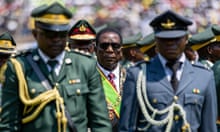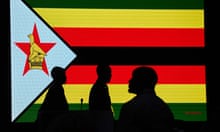Zimbabwe will start issuing gold coins as legal tender in late July, its central bank has said, as the country battles to control runaway inflation that has considerably weakened the local currency.
The inflation rate more than doubled last month to 191%, stoking memories of the hyperinflation of the 2000s that saw the Zimbabwean dollar redenominated three times before being effectively abandoned in 2009.
The governor of the Central bank, John Mangudya, said the gold coins would act as a store of value and were expected to reduce the demand for US dollars – a phenomenon largely blamed for the tumbling value of the local currency.
“The gold coins will be available for sale to the public in both local currency and US dollars and other foreign currencies at a price based on the prevailing international price of gold and the cost production,” Mangudya said in a statement.
The gold coins, named Mosi-oa-Tunya, after Victoria Falls, can be converted into cash and be traded locally and internationally.
According to Reuters, the coins will each contain one troy ounce of gold and will be sold by Fidelity Gold Refinery, Aurex and local banks.
Zimbabweans expressed mixed feelings over the news.
“I cannot trust the central bank to give me a coin while they hold my cash,” said Evans Mupachikwa, a foreign currency trader. “Zimbabwe is known for policy inconsistencies. What if they wake up and say the coins are no longer tradable?.”
Another foreign currency trader, Munesu Mandiopera,said: “Gold is expensive. I do not think many of us will afford to buy the coins. Many will continue to keep their money at home. This is another failed move by the government.”
Zimbabweans have an uneasy relationship with the central bank and its policies, as monetary authorities continue to fail the credibility test.
In 2008 – the year a $100bn note went into circulation – Zimbabweans lost their savings including pensions when the Zimbabwean dollar crashed. Many Zimbabweans choose to keep money in their houses or under their beds instead of going to the bank.
Zimbabwe abandoned its inflation-ravaged dollar in 2009, opting instead to use foreign currencies, mostly the US dollar. The government reintroduced the local currency in 2019 but it has rapidly lost value again.
Last week, the finance minister, Mthuli Ncube, said the gold coins “will give you more value”.
Gold coins are used by investors internationally to hedge against inflation, according to economist Prosper Chitambara.
“Their major role is to act as a store of value but also to work as a viable investment asset. The value of gold has always been increasing at times the global economy has been on recession,” Chitambara said, adding that the high demand for the US dollar in Zimbabwe, which is fuelling exchange rate volatility, would weaken as the public accepts the gold coins.
However, he said the new monetary policy intervention by the central bank would not address inflation, which is expected to continue soaring.
“It could influence inflation, but it is not the panacea to the inflation problem because inflation is triggered largely by money supply growth. When there is an alternative store of value, the depreciation of the local currency will be contained,” Chitambara said.
The central bank last week raised interest rates to 200% from 80% and outlined plans to make the US dollar legal tender for the next five years to boost confidence.
Under President Emmerson Mnangagwa, who took over from Robert Mugabe in a military putsch in 2017, Zimbabwe has witnessed an economic tailspin, compounding a hunger crisis that has followed poor rains.
Reuters contributed to this report









